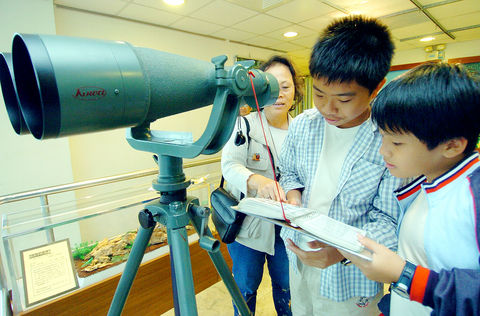The Council of Agriculture yesterday issued a warning against smuggling birds infected with avian flu into the country from China, and urged the public to report any suspected violations.
The alert came after media reports that some Taiwanese professors have planned to sneak in diseased birds from China in order to help develop a flu vaccine.
"Such specimens could spread the bird flu virus and pose a high risk to the health of birds, other animals and humans in Taiwan," said Yeh Ying (

PHOTO: LO PEI-DER, TAIPEI TIMES
According to Chinese-language media reports, professors in veterinary departments at some universities have collected specimens of the avian flu virus in China and plan to bring them into Taiwan for testing.
The bureau cautioned that people should not bring any plants, animals or specimens into the country without permission.
Such smugglers may be pro-secuted for violating the Statute for Prevention and Control of Infectious Animal Diseases (
Yeh said the council hasn't received any report of suspected violations, but will keep in close contacts with universities, and include academics who often traveled to China on its watch list.
The council also set up a special direct phone line for people to report suspected violations at 0800-039131.
Officials of Taiwan's Center for Disease Control also announced that Chen Hsi (
He was first detained on Oct. 14.
The man shows no sign of having the bird flu himself, but is being given the drug Tamiflu as a precaution, officials from the center said.
Meanwhile, birdwatching societies in Taipei City yesterday called on the public not to fear birdwatching activities, stressing that the activity is safe.
No contact
"Birdwatching doesn't mean being close to wild birds or touching them," said Liu Hsin-bai (劉新白), general director of Wild Bird Society of Taipei (WBST).
"Birdwatchers actually keep dozens of meters away from birds, and they usually serve as front-line monitors for signs of any suspicious sickness of birds," Liu said.
According to Liu, birdwatching societies in several counties have been working with the council since 1997 to monitor the activities of migratory birds and take samples of droppings. There hasn't been any bird flu virus found in wild birds so far.
Lin Hsian-wen (
The human deaths from bird flu that have occured in Southeast Asia were a result of people coming into close daily contact with infected poultry within the confines of poultry farms. The risk to human health from wild birds carrying avian influenza is very low, Lin said.
Festival to go ahead
Neither the council nor the Taipei City Government have thus far discouraged outdoor birdwatching activities.
According to the Taipei City Department of Information, the city government will still hold the "2005 Guandu International Birdwatching Festival" beginning Nov. 12 and it is encouraging people to join the event.

The Ministry of the Interior (MOI) is to tighten rules for candidates running for public office, requiring them to declare that they do not hold a Chinese household registration or passport, and that they possess no other foreign citizenship. The requirement was set out in a draft amendment to the Enforcement Rules of the Public Officials Election and Recall Act (公職人員選舉罷免法 ) released by the ministry on Thursday. Under the proposal, candidates would need to make the declaration when submitting their registration forms, which would be published in the official election bulletin. The move follows the removal of several elected officials who were

The Republic of China (ROC) is celebrating its 114th Double Ten National Day today, featuring military parades and a variety of performances and speeches in front of the Presidential Office in Taipei. The Taiwan Taiko Association opened the celebrations with a 100-drummer performance, including young percussionists. As per tradition, an air force Mirage 2000 fighter jet flew over the Presidential Office as a part of the performance. The Honor Guards of the ROC and its marching band also heralded in a military parade. Students from Taichung's Shin Min High School then followed with a colorful performance using floral imagery to represent Taiwan's alternate name

FOUR DESIGNATED AREAS: Notices were issued for live-fire exercises in waters south and northwest of Penghu, northeast of Keelung and west of Kaohsiung, they said The military is planning three major annual exercises across the army, navy and air force this month, with the navy’s “Hai Chiang” (海強, “Sea Strong”) drills running from today through Thursday, the Ministry of National Defense said yesterday. The Hai Chiang exercise, which is to take place in waters surrounding Taiwan, would feature P-3C Orion maritime patrol aircraft and S-70C anti-submarine helicopters, the ministry said, adding that the drills aim to bolster the nation’s offshore defensive capabilities. China has intensified military and psychological pressure against Taiwan, repeatedly sending warplanes and vessels into areas near the nation’s air defense identification zone and across

COVETED PRIZE: The US president would be a peace prize laureate should he persuade Xi Jinping to abandon military aggression against Taiwan, William Lai said US President Donald Trump should get the Nobel Peace Prize should he be able to convince Chinese President Xi Jinping (習近平) to abandon the use of force against Taiwan, President William Lai (賴清德) told a conservative US radio show and podcast in an interview. The US is Taiwan’s most important international backer, despite the absence of formal ties, but since Trump took office earlier this year he has not announced any new arms sales to the nation. Trump could meet Xi at the APEC summit in South Korea on Oct. 31 and Nov. 1. Lai, speaking on The Clay Travis and Buck Sexton